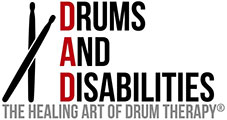D.A.D. RESEARCH SHOWS DRUMMING FIGHTS SYMPTOMS OF DISABILITIES
PRESS RELEASE

FOR IMMEDIATE RELEASE
9-4-2014
SURREY U.K. (September 4, 2014) – Music can help children and adults with autism and other disorders, to stop violent behavior and cutting, and can help them develop cognition, social skills, and grade point average. This according to a new research study conducted at the Woodland Grange School in Surrey, England, and with the non-profit organization D.A.D., (Drums and Disabilities).
The Department of Education is distributing the results of the groundbreaking study in September 2014, in an effort to help teachers teach special needs students.The study was conducted by David Ciauro (EdS, MA, LAC), Pat Gesualdo, D.A.D. President/CEO, Teacher Christopher Topple, and Colin Jenkinson, Head Teacher for the Woodland Grange School.
“The study participants in our school have stopped violent behavior, self-mutilation, and have achieved a 100% attendance record, as a result of this groundbreaking Drum Therapy® research,” says Head Teacher Colin Jenkins on. “Their parents and I are in total disbelief of their success.”
For people with autism and certain disabilities, the synapses in the brain ineffectively communicate with each other. The researchers found that playing repeated patterns of music rhythms can re-train these synapses, and can help these people establish the correct synapse pathways. Playing repeated patterns of music rhythms which the researchers called “Drum Therapy,” helped the study participants to re-train the synapses in the brain, and develop physical and cognitive functioning.
Several clinical research studies prove that music and drumming are a beneficial treatment for disabilities. To test this theory, the investigators tested 5 children ages 9 to 15, and 4 adults between the ages of 30 and 55. The participants had autism, o.d.d., dyslexia, and violence and behavioral issues.The investigators measured the participant’s ability and behavior, and exposed them to specific methods of drumming they called “Drum Therapy.” All the participant’s abilities were severely limited since birth. One adult Johnny, was extremely limited non-verbal, severely low functioning with no coordination, and needed assistance walking. One adult Larry had autism, one adult Joe had violence issues and was low functioning, one adult Andre had O.D.D.., three children had A.D.D. and Dyslexia, one child had violence issues and engaged in frequent self-mutilation, two of the children had violence issues and low school attendance records.
Six months into the study, the limited verbal adult Johnny could count to 10 outloud, and do cross opposite hand and foot patterns at the same time. The children with A.D.D. and Dyslexia improved their retention and coordination. The children completely stopped self-mutilation and violent behavior, and achieved a 100% school attendance record.
“Drum Therapy was a beneficial treatment for the study participants,” Gesualdo says. “The results are promising that it might be used as an appropriate, alternative therapy for other disabilities, which can help people live happier and healthier through music.
ABOUT D.A.D.
Drums and Disabilities (D.A.D.),is a 501 (C) (3) non-profit research program. Psychologists, neuroscientists, law enforcement agencies, special needs therapists, child protective service agencies, and teachers in over 15 countries use the D.A.D. Program to help special needs children develop physical and cognitive functioning.
Numerous celebrities, sports stars, major corporations, and parents join with D.A.D. to help children fight disabilities on a Global basis.
D.A.D. is also the parent company of the Metal Hall of Fame, which holds the Annual Metal Hall of Fame Celebrity Charity Gala. It is dedicated to forever enshrining the Iconic musicians and music industry executives responsible for making hard rock and heavy metal music what it is today. Their contribution to the genre is invaluable, and they continue to inspire fans throughout the world, from generation to generation. The Metal Hall of Fame helps to raise funds for D.A.D., which provides free therapy programs for special needs children, adults, and wounded veterans throughout the United States.
For more information
Please contact D.A.D. Headquarters at
Official Websites
